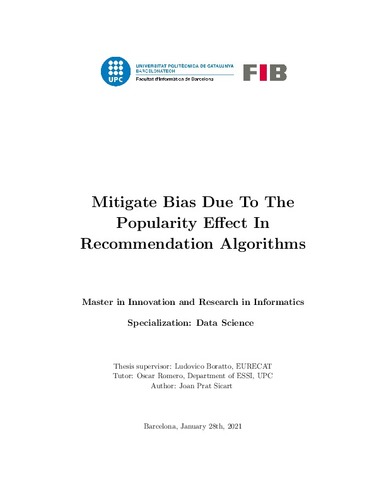Mostra el registre d'ítem simple
Mitigate Bias Due To The Popularity Effect In Recommendation Algorithms
| dc.contributor | Romero Moral, Óscar |
| dc.contributor.author | Prat Sicart, Joan |
| dc.contributor.other | Universitat Politècnica de Catalunya. Departament d'Enginyeria de Serveis i Sistemes d'Informació |
| dc.date.accessioned | 2021-04-08T13:21:02Z |
| dc.date.available | 2021-04-08T13:21:02Z |
| dc.date.issued | 2021-01-28 |
| dc.identifier.uri | http://hdl.handle.net/2117/343343 |
| dc.description.abstract | The objective of group recommendations is to provide a ranked set of items, a Top-NG, that contains relevant items for every member of the group. A common approach to achieve this consists on select- ing items the group can agree to, by means of so called "group modeling strategies". However, most of these group modeling strategies select items independently of the previous already selected items. Therefore, they can not guarantee properties such as fairness. Understanding fair recommendations means providing an equitable number of relevant items and in similar ranks for each member. Apart from that, there exist also group modeling strategies that try to provide fair recommendations by penalizing or simply dismissing the opinion of those members that obtained a significant item in the previous recommendation, and consequently considering just the happiness of a subset of users instead of the overall group happiness. In this thesis, we introduce a novel definition of fairness that balances the preferences of the members without penalizing or dismissing their opinion, just simply making it more tolerant or more radical according to "how favorable were the previous recommendations for him in comparison with the oth- ers". In this thesis we also mathematically formalize this notion and we provide an algorithm, ARM (Adaptive Relevance-based Modeling), for finding the Top-NG set of group recommendations that satisfy our definition. We benchmark the performance of ARM against 5 of the most widely known group modeling strategies in the literature. Also, we evaluated the performance of all of them for 12 configurations (one dataset, three different group types, and four different metrics to evaluate the group modeling performance). At the end, we found out that ARM performed better in 10 out of 12 scenarios, and in only two of them it generated a recommendations slightly worse than another strategy, providing in this way a significant improvement to the literature. We attribute ARM's success to its novel criteria and its new approach on balancing the user prefer- ences. Most of the current methods do not select items according also with the precedent selected items in Top-NG when generating a new recommendation, and the ones that do, provide to recom- mendations that do not consider always all the user preferences |
| dc.language.iso | eng |
| dc.publisher | Universitat Politècnica de Catalunya |
| dc.subject | Àrees temàtiques de la UPC::Informàtica |
| dc.subject.lcsh | Recommender systems (Information filtering) |
| dc.subject.lcsh | Algorithms |
| dc.subject.other | Group Recommender Systems |
| dc.subject.other | Fairness |
| dc.subject.other | Evaluation metrics |
| dc.subject.other | Adaptative Relevance-based Modeling |
| dc.subject.other | Balanced Normalized Discounted Cumulative Gain |
| dc.title | Mitigate Bias Due To The Popularity Effect In Recommendation Algorithms |
| dc.type | Master thesis |
| dc.subject.lemac | Sistemes recomanadors (Filtratge d'informació) |
| dc.subject.lemac | Algorismes |
| dc.identifier.slug | 158036 |
| dc.rights.access | Open Access |
| dc.date.updated | 2021-02-04T05:00:18Z |
| dc.audience.educationlevel | Màster |
| dc.audience.mediator | Facultat d'Informàtica de Barcelona |
| dc.audience.degree | MÀSTER UNIVERSITARI EN INNOVACIÓ I RECERCA EN INFORMÀTICA (Pla 2012) |


